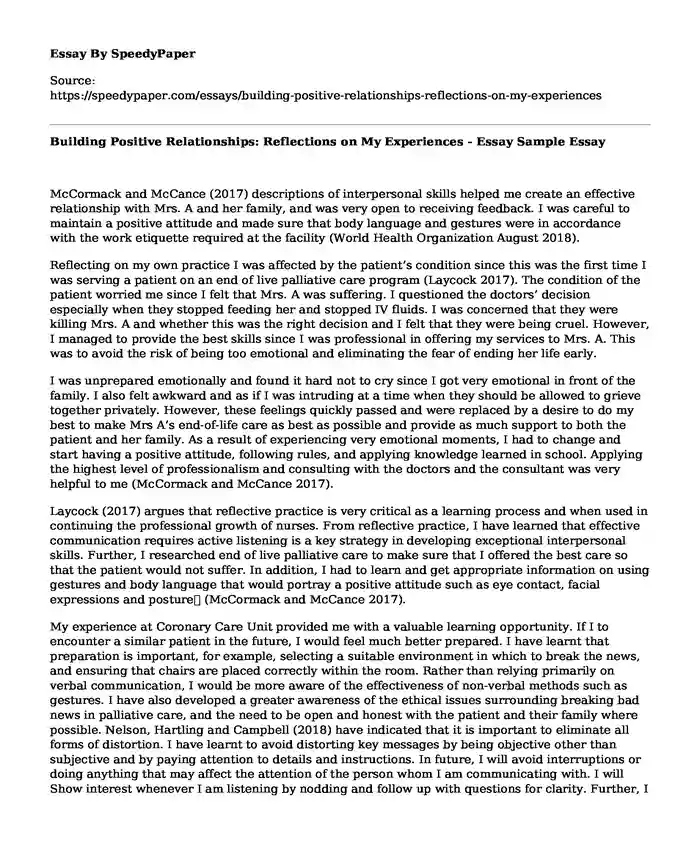
| Type of paper: | Essay |
| Categories: | Healthcare Emotional intelligence |
| Pages: | 3 |
| Wordcount: | 811 words |
McCormack and McCance (2017) descriptions of interpersonal skills helped me create an effective relationship with Mrs. A and her family, and was very open to receiving feedback. I was careful to maintain a positive attitude and made sure that body language and gestures were in accordance with the work etiquette required at the facility (World Health Organization August 2018).
Reflecting on my own practice I was affected by the patient’s condition since this was the first time I was serving a patient on an end of live palliative care program (Laycock 2017). The condition of the patient worried me since I felt that Mrs. A was suffering. I questioned the doctors’ decision especially when they stopped feeding her and stopped IV fluids. I was concerned that they were killing Mrs. A and whether this was the right decision and I felt that they were being cruel. However, I managed to provide the best skills since I was professional in offering my services to Mrs. A. This was to avoid the risk of being too emotional and eliminating the fear of ending her life early.
I was unprepared emotionally and found it hard not to cry since I got very emotional in front of the family. I also felt awkward and as if I was intruding at a time when they should be allowed to grieve together privately. However, these feelings quickly passed and were replaced by a desire to do my best to make Mrs A’s end-of-life care as best as possible and provide as much support to both the patient and her family. As a result of experiencing very emotional moments, I had to change and start having a positive attitude, following rules, and applying knowledge learned in school. Applying the highest level of professionalism and consulting with the doctors and the consultant was very helpful to me (McCormack and McCance 2017).
Laycock (2017) argues that reflective practice is very critical as a learning process and when used in continuing the professional growth of nurses. From reflective practice, I have learned that effective communication requires active listening is a key strategy in developing exceptional interpersonal skills. Further, I researched end of live palliative care to make sure that I offered the best care so that the patient would not suffer. In addition, I had to learn and get appropriate information on using gestures and body language that would portray a positive attitude such as eye contact, facial expressions and posture (McCormack and McCance 2017).
My experience at Coronary Care Unit provided me with a valuable learning opportunity. If I to encounter a similar patient in the future, I would feel much better prepared. I have learnt that preparation is important, for example, selecting a suitable environment in which to break the news, and ensuring that chairs are placed correctly within the room. Rather than relying primarily on verbal communication, I would be more aware of the effectiveness of non-verbal methods such as gestures. I have also developed a greater awareness of the ethical issues surrounding breaking bad news in palliative care, and the need to be open and honest with the patient and their family where possible. Nelson, Hartling and Campbell (2018) have indicated that it is important to eliminate all forms of distortion. I have learnt to avoid distorting key messages by being objective other than subjective and by paying attention to details and instructions. In future, I will avoid interruptions or doing anything that may affect the attention of the person whom I am communicating with. I will Show interest whenever I am listening by nodding and follow up with questions for clarity. Further, I will summarize and emphasize important features to be understood and to understand the person I am serving.
References
Chen, R. F., & Hsiao, J. L. (2012). An investigation on physicians’ acceptance of hospital information systems: A case study. International Journal of Medical Informatics, 81(12), 810-820. https://doi.org/10.1016/j.ijmedinf.2012.05.003
Laycock, B. (20 March 2017). What is person-centered planning . Banbury, UK: Families Leading Planning UK. Retrieved 2 August 2020
McCormack, B. and McCance, T. (2017) Person-Centred Practice in Nursing and Health Care: Theory and Practice, 2nd Edition, Chichester, West Sussex. Available from: Wiley Australia
Nelson C, Hartling L. & Campbell S, et al. (2018) The effects of audience response systems on learning outcomes in health professions education. A BEME systematic review: BEME Guide No. 21. Med Teach. 2012;34:e 386–405.
Nursing and Midwifery Board Australia (2016) Registered Nurse Standards for Practice https://www.cdu.edu.au/sites/default/files/health/docs/nmba_registered_nurse_standards_for_practice.pdf Retrieved 2 August 2020
Sanderson, H. & Lewis, J. (2012). A practical guide to delivering personalization: Person-centred practice in health and social care. London: Jessica Kingsley Publishers.
World Health Organization (WHO). (August 2018). Increasing complexity of medical technology and consequences for training and outcome of care. (Background paper 4). https://apps.who.int/iris/bitstream/handle/10665/70455 /WHO_HSS_EHT_DIM_10.4_eng.pdf
Cite this page
Building Positive Relationships: Reflections on My Experiences - Essay Sample. (2023, Nov 15). Retrieved from https://speedypaper.net/essays/building-positive-relationships-reflections-on-my-experiences
Request Removal
If you are the original author of this essay and no longer wish to have it published on the SpeedyPaper website, please click below to request its removal:
- Free Paper Sample on Police Attitude Towards African-Americans
- Essay Sample Comprising the Nutrition Journal
- Free Essay on Terrorism and Homeland Security: Future Prospects
- Essay Sample on Patient Self Determination Act
- Free Essay: Challenges Related to the Evaluation of Malaria Programs
- Emergency Medical Care: Specialist Response to Save Lives - Essay Sample
- Critical Thinking: Understanding Travel and Movement among the Elderly - Article Analysis Essay
Popular categories




